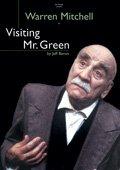Visiting Mr Green
Mr Green is a man in his eighties whose wife of almost 60 years has recently died. He lives alone in a small apartment in New York. He reads none of his mail, has no food in his refrigerator, his telephone isn't connected, and he has limited contact with any other human being. In a very real sense, he's simply waiting to die like the flowers in the vase on his table.
Ross Gardiner is a young, intelligent professional with a successful and progressive career. On the emotional front, though, there's much less to be content about. Ross is finding it tough being gay, and though his parents are affluent socialites, his father's homophobia and lack of acceptance of his son's sexuality has left Ross insecure and emotionally drained.
When Mr Green is almost run down crossing the road, the driver, Ross, is given community service which involves visiting Mr Green and doing basic chores for him. Thus, two rather lonely and confused people are thrown unceremoniously together.
When they first meet, there seems to be little in common between two characters at opposite ends of the age spectrum. Ross can't understand how Mr Green copes without basic things like a telephone, while Green can't see why he would want one. But, as the characters get to know each other, positions and attitudes shift.
Since its first showing in 1996, this play has been produced more than 300 times in around 40 countries and been translated into 22 languages. It's obviously a play with universal appeal, and has rekindled the career of Warren Mitchel who again takes the role of Mr Green having already played it several times in the UK as well as Australia, even playing opposite his son in one production.
The first half of this play is a little on the slow side, but that's in the nature of the piece as the characters struggle with the uncomfortable situation the enforced relationship has put them in. The pace picks up though in the second half and there's much more humour as the characters start to wrestle with more important and pressing emotional problems.
As an octogenarian himself, Warren Mitchell is obviously not the same actor who played a superb Willy Loman in Arthur Miller's 'Death of a Salesman', or the mouthy and nauseating Alf Garnett in the immensely popular BBC series 'Till Death Us Do Part'. But it's great to see Mitchell back on stage in a role that suits his age, temperament and wit. Mitchell might be a little slower moving around the stage, but he's lost none of his sense of comic timing, or the keen ability to milk a situation for laughs by means of a simple gesture, or facial expression. Apparently, talent doesn't desert you as you grow older, even if agility does. Mitchell's portrayal is neither routine nor stagnant, in spite of the fact that he's tackled the role repeatedly.
Gideon Turner plays Ross Gardiner with restrained youthful energy and rightly so. He gives us a thoughtful, caring and intense young man who can't quite see that he has prejudices of his own to contend with. Turner provides the appropriate contrast and counterbalance for Mitchell, refusing to be overawed by Mitchell's reputation or his still considerable presence.
It's little wonder that 'Visiting Mr Green' has been produced so often and so regularly in such a short lifetime. It has an endearing and captivating charm, and there's almost something for everyone. It's themes cover persecution, the ups and downs of family relationships, understanding the desires and needs of other people, and the ability to cope with love and loss among others. It also capitalises on the appeal of the Jewish sense of humour and temperament that is universally recognised and appreciated.
There's nothing very new, very radical or unique in 'Mr Green', but it's nevertheless one of those plays that you come out of feeling quite good about, even if you're not exactly feeling good about yourself. Yes, it's sentimental and, yes, it has some holes in the logic department which leave some unanswered questions. But, perhaps what makes the play popular in every corner of the planet is that it offers some sense of hope. And as we all race towards old age that's not a bad thing to hold on to.
(Peter Brown)
What the popular press had to say.....
NICHOLAS DE JONGH for THE EVENING STANDARD says, "[Warren Mitchell] offers another beautifully nuanced, edgy performance as the self-contained, physically frail widower." MICHAEL BILLINGTON for THE GUARDIAN says, "Strikes me as a thin-textured, sentimental piece that depends heavily on the skill of its two performers." CHARLES SPENCER for THE DAILY TELEGRAPH says, "Mildly amusing, unashamedly sentimental, a touch glib, but with its heart in the right place." BENEDICT NIGHTINGALE for THE TIMES says, "Baron's play is sufficiently well written for one to overlook, or try to overlook, its flaws."
External links to full reviews from popular press
The Guardian
Daily Telegraph
The Times
Originally published on
